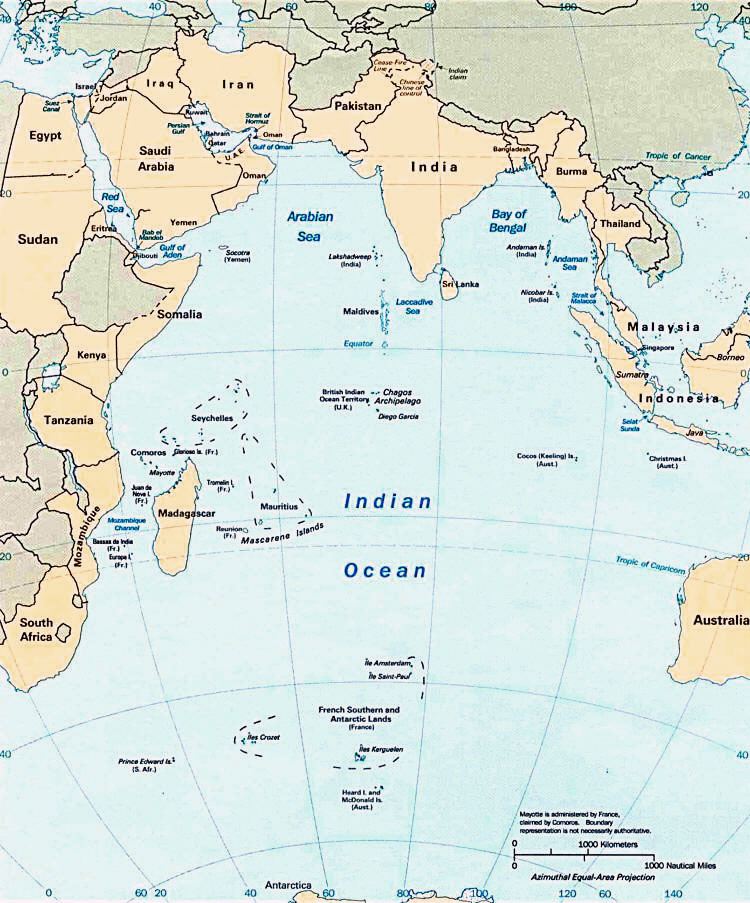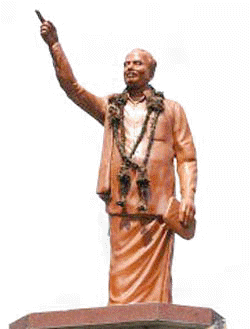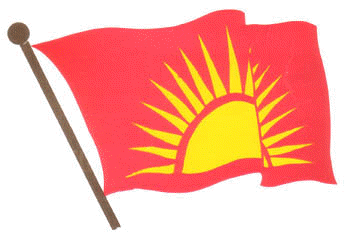On 15 January Indian Foreign Secretary
Shivshankar Menon shamelessly declared in
Colombo that relations with Sri Lanka have reached
"an unprecedented level of depth and quality today". It
was shameless because New Delhi armed and trained
Tamil militants in the 1980s and used Eelam Tamils as
expendable pawns in order that New Delhi may destablise
Colombo and in that way secure the 'unprecedented
depth and quality' of its current relations with
Sinhala Sri Lanka.
"...Most Tamil separatists from Sri
Lanka had accepted the Indian offer (to provide arms
and training in the 1980s) at its face value,
thinking that New Delhi was reaching out to them out
of genuine concern for their condition. However, an
extraordinary revelation began to unfold as the
training started. Many guerrillas realized that the
training was just a subterfuge for a larger
strategic game that India was attempting to play,
a game in which the Tamil rebels may end up being
just expendable pawns." Inside an Elusive
Mind - Prabhakaran, M.R.Narayan Swamy,
2003
The words of Indian Foreign Secretary
Shivshankar Menon's predecessor in office Mr.Jyotindra
Dixit in 1998 remain etched in the memory of the
Tamil people.
"...Tamil militancy received
(India's) support ...as a response to (Sri
Lanka's).. concrete and expanded military and
intelligence cooperation with the United States,
Israel and Pakistan. ...The assessment was that these
presences would pose a strategic threat to India and
they would encourage fissiparous movements in the
southern states of India. .. a process which could
have found encouragement from Pakistan and the US,
given India's experience regarding their policies in
relation to Kashmir and the Punjab.... Inter-state
relations are not governed by the logic of morality.
They were and they remain an amoral phenomenon....."
J.N.
Dixit on India's Role in the Struggle for Tamil
Eelam
Mr.Dixit was being economical with
truth when he suggested that New Delhi's foreign policy
in relation to the Tamil Eelam struggle was 'amoral'.
New Delhi's foreign policy was not amoral. It was immoral.
An amoral person denies the existence
of morality, whereas an immoral person believes in the
existence of morality but chooses not to comply with
it. The question is whether Mohandas Karamchand Gandhi's India
denies the existence of morality, and if not whether it
was moral for New Delhi to
knowingly sacrifice Tamil lives in the altar of New
Delhi's perceived strategic interests in the Indian Ocean
region. The question also is whether it was moral
for the same New Delhi to thereafter arm and train
President Rajapaksa's Sri Lanka armed forces so that
New Delhi may embed its influence in the island of Sri
Lanka in depth.
The truth is that the 'unprecedented
level of the depth and quality' of New Delhi's current
relationship with Sinhala Sri Lanka was purchased by
New Delhi at the price of a no less unprecedented loss
of Eelam Tamil lives and Tamil suffering.
On 14 October 2008, Indian
External Affairs Minister Pranab Mukherjee speaking in
the Indian Parliament was disarmingly frank -
"We have a very comprehensive
relationship with Sri Lanka. In our anxiety to
protect the (Tamil) civilians, we should not forget
the strategic importance of this island to India's
interests,... especially in view of attempts by
countries like Pakistan and China to gain a strategic
foothold in the island nation...Colombo had been told
that India would "look after your security
requirements, provided you do not look around."

The short point is that without 'making
use' of the Tamil Eelam struggle for freedom, New
Delhi would not have been able to advance its
perceived strategic interests in the Indian Ocean
region and prevent 'countries like Pakistan and
China' gaining 'a strategic foothold in the island
nation'.
In October 2008, amidst the posturing (and ultimatums) by
Jayalalitha and Karunanidhi in Tamil Nadu
we
wrote :
"..If
President Rajapakse does play ball and distances
himself from China/Pakistan/Iran to the extent that
New Delhi desires, then something like the 1988
comic opera Provincial Councils Act (and that too,
with a divided North and
Eastern Province) sweetened with 'humanitarian aid'
for the suffering Eelam Tamils will be presented by
New Delhi to the Tamil people, including the people
of Tamil Nadu, and marketed as a great boon - and
will be dutifully welcomed by the likes of
Karunanithi and Jayalalitha as a victory for the
'tough stand' that they had taken to 'persuade' New
Delhi." We
won't stop military cooperation with Lanka says
Indian External Affairs Minister Pranab Mukherjee,
October 2008
And so today, after the occupation of
Killincochi and other parts of the Tamil homeland by
the Sinhala armed forces, and whilst the Sri Lanka
armed forces continue their genocidal onslaught on the
Tamil homeland, Indian Foreign Secretary Shivshankar
Menon visits Colombo and expresses his
appreciation of the sentiments of Sri Lanka
Minister Bogollagama that the Indo-Lanka
Accord and the 13th
Amendment to the Constitution are the answers to
the conflict in the island. The Accord and the 13th
Amendment have everything to do with ensuring New
Delhi's strategic hold on Sri Lanka and has little to
do with addressing the issues raised by the Tamil
struggle for freedom from alien Sinhala rule - a
struggle for freedom which commenced with Gandhian
leader S.J.V.Chelvanayagam's
historic statement in 1975 -
"Throughout the ages the Sinhalese
and Tamils in the country lived as distinct sovereign
people till they were brought under foreign
domination. It should be remembered that the Tamils
were in the vanguard of the struggle for independence
in the full confidence that they also will regain
their freedom. We have for the last 25 years made every
effort to secure our political rights on the basis of
equality with the Sinhalese in a united
Ceylon."
"It is a regrettable fact that
successive Sinhalese governments have used the power
that flows from independence to deny
us our fundamental rights and reduce us to the
position of a subject people. These governments
have been able to do so only by using against the
Tamils the sovereignty common to the Sinhalese and
the Tamils."
"I wish to announce to my people and
to the country that I consider the verdict at this
election as a mandate that the Tamil Eelam nation should exercise the
sovereignty already vested in the Tamil people and
become free."
On the 13th Amendment and the Sri Lanka
Provincial Councils Act, we
said it in 1988 and we say it again -
 " The
blunt reality is that those who proclaim that the
13th Amendment is intended to share power between the
Tamil people and the Sinhala people, are, to use a
colloquialism, 'trying to pull a fast one' on the
Tamil people. Under the 13th Amendment power will
continue to reside in a Sinhala dominated Central
government, within the frame of an unitary
constitution. The 13th Amendment seeks to create a
Constitutional frame within which the Sinhala people
may rule the Tamils of Eelam more effectively by
creating and nurturing a class of Tamils dependent on
the patronage of a Sinhala dominated Central
Government for their political and perhaps, even
their physical, survival.
" The
blunt reality is that those who proclaim that the
13th Amendment is intended to share power between the
Tamil people and the Sinhala people, are, to use a
colloquialism, 'trying to pull a fast one' on the
Tamil people. Under the 13th Amendment power will
continue to reside in a Sinhala dominated Central
government, within the frame of an unitary
constitution. The 13th Amendment seeks to create a
Constitutional frame within which the Sinhala people
may rule the Tamils of Eelam more effectively by
creating and nurturing a class of Tamils dependent on
the patronage of a Sinhala dominated Central
Government for their political and perhaps, even
their physical, survival.
It has created Provincial Ministers
who will not exercise executive power but who will
have executive power exercised 'through' them!. At
the same time it has created a Provincial Governor
appointed by the Sinhala President who will exercise
executive power in respect of provincial matters - a
Provincial Governor who is also the administrative
head of the provincial public service and who has
control of the Provincial Finance Fund. And the 13th
Amendment has created a Provincial Council without
control of planning, without control of the
provincial budget, without control of police and
public order within the province, without control of
disposition of state land within the province,
without control of higher education and whose
remaining meagre legislative powers are subject to
the over riding will of the Central Parliament.
Finally, the provisions of the Provincial Councils
Act itself may be amended from time to time by a
simple majority of members present and voting in
Parliament"
It is this 13th Amendment which Indian
Foreign Secretary Shivshankar Menon now welcomes as the
solution to the conflict in the island. And it is this 13th Amendment
and the Sri Lanka Provincial Councils Act which is being touted by New Delhi's
agents in the capitals of the world as a panacea with
veiled promises of safe passage for Velupillai
Pirabakaran and Pottu Amman and covert suggestions that
'we can do business with B.Nadesan'.
"..New Delhi has no desire to lose
its ability to play the 'Tamil card' to keep Sri
Lanka in line in the years to come - even after the
successful annihilation of Velupillai Pirabakaran and
the weakening of the LTTE. And so New Delhi
proclaims ad nauseam that they are concerned to
secure the 'legitimate aspirations' of the Tamil
people. Additionally it builds its
own network amongst dissident Tamils in Sri Lanka, in
Tamil Nadu and abroad to propagate its
interests." Black Pebbles and White Pebbles,
Nadesan Satyendra, 2006
New
Delhi believes that with power it can surmount
principle. Canute like it seeks to order the rising
tide of Tamil nationalism to recede. New Delhi
believes that it can 'pacify' Tamil nationalism by
channelling it into a 'cultural no mans land'. Give
'culture' to those who ask for political equality and
freedom. At the Bastille, it was Marie Antoinette who
reportedly offered cake to the revolutionaries who
struggled for freedom. Marie Antoinette was hopelessly
wrong then. So also are the mandarins of New Delhi
today.
It is no
empty slogan devoid of content to say -

Each Tamil wherever he
lives is a part of that Tamil nation and even if he
should forget his national identity, the environment
around him will conspire to remind him from time to
time, of that which he may have forgotten.
The growing togetherness of more than
70 million people living in many lands and across
distant seas, many thousands as refugees
and asylum seekers is an enduring political
reality. It is a togetherness rooted in an ancient
heritage, a rich language and literature, and
a
vibrant culture. But it is a togetherness which is
not simply a function of the past. It is a growing
togetherness consolidated by struggle and
suffering and, given purpose and direction by the
aspirations of a people for the future - a future where
they and their children and their children's children
may live, not in luxury, but in equality
and in
freedom and with dignity. In Tamil we say
thanmaanam.
"We are one people.. Distress
binds us together, and, thus united, we suddenly
discover our strength. Yes, we are strong enough to
form a state and a model state. We possess all human
and material resources for the purpose."
- *Theodor Herzl : The Jewish State,
1882 quoted in Wittamayer Baron - Modern
Nationalism and Religion, New York 1947
"உலகெங்கும்
தமிழன்
பரந்து
வாழ்ந்தாலும்..
தமிழீழத்திலேதான்
தனியரசு
உருவாகும்
வரலாற்றுப்
புறநிலை
தோன்றியுள்ளது..."
Velupillai
Pirabaharan
The
rising tide of Tamil nationalism is reflected in the
growing support that the ordinary people of Tamil Nadu have
extended to the Tamil Eelam struggle for freedom from
alien Sinhala rule - a wide spread support across
caste and religion and given eloquent expression by persons
such Bharathiraja, Director Seeman, Director Cheran,
Vaiko, Nedumaran, Suba Veerapandiyan, Pulamaipithan,
Thol. Thirumavalavan, Arivumathi and many others
Some of them have paid the price of being arrested and
incarcerated for giving expression to their feelings -
arrested and incarcerated by the police of a Tamil Nadu
government headed by Chief Minister Karunanithi. For
New Delhi political reality is not reflected in that
which
Natteri Adigal said in Merinews on 9 October 2008
-
 "...if the fictitious concept of
placing 'country's interests above human rights,
ethnic pride and identity' continues to be promoted
for long, it will be a matter of time for India too
to meet the fate of USSR or Yugoslavia or now Sri
Lanka... In 1965, when Tamil Nadu faced the
possibility of military action from a powerful New
Delhi, Annadurai opted to abandon his
demand for full autonomy for states under a lose
confederation with one currency but multiple ethnic,
cultural and national identities.
"...if the fictitious concept of
placing 'country's interests above human rights,
ethnic pride and identity' continues to be promoted
for long, it will be a matter of time for India too
to meet the fate of USSR or Yugoslavia or now Sri
Lanka... In 1965, when Tamil Nadu faced the
possibility of military action from a powerful New
Delhi, Annadurai opted to abandon his
demand for full autonomy for states under a lose
confederation with one currency but multiple ethnic,
cultural and national identities.
Today, Tamil Nadu appears headed for
revolutionary political changes in a culmination of a
combination of events: For one, the two main
Dravidian political outfits - Dravida Munnetra
Kazhagam (DMK), headed by three-time chief minister M
Karunanidhi and All India Anna Dravida Munnetra
Kazhagam (AIADMK), headed by former two-term CM
Jayalalitha - are both reeling under overwhelming
outrage among the Tamil population...The ground
reality in Tamil Nadu is that almost every Tamil -
belonging to whatever religion or strata - has a
primary affinity to other Tamil-speaking people of
whatever domicile or religion..."
For New
Delhi political reality is not reflected in the
warnings such as those given by M.S.S.Pandian in
the Times of India on 23 October 2008 -
"Tamil Nadu had a history of
demanding secession from the Indian Union. Yet, over
time, it has chosen to integrate itself fully with
the national mainstream. If New Delhi does not change
course in its Sri Lankan policy, it may plant the
seeds towards a reversal of such history. That will
be India's misfortune". Change Course in Sri Lanka or Face
Misfortune - M.S.S.Pandian, 23 October
2008
It appears that for New Delhi, it is
Sri Lankan Army Chief Sarath Fonseka's statement
on 7 December 2008 that 'New Delhi won't listen to the
political jokers in Tamil Nadu' that accords with the
political reality.
We said
many long years ago in 2001 -
"...the break up of India, if it
comes will not come from the efforts of tamilnation.org. It will come despite our
efforts."... Tamil Nation and the Unity
of India, Nadesan Satyendra, February
2001
And the
time has comes for us to say openly and clearly that
Sonia Gandhi's Manmohan Singh administration has now
planted the seeds for what may be the inevitable break
up of India. True, today, there is an Indian
state. But there is no Indian nation. A state is an
institution. A nation is a community of people. There
is, if anything, an Indian Empire - the remnants of the
old British Indian Empire.
For the British, India
was itself an Empire unlike
Australia, Canada, Ceylon which were states in the
British Empire. That is why
for instance Queen Victoria was Empress of India but
Queen of Ceylon. And out of this Indian Empire
bequeathed by the British, an 'Indian nation' cannot
be built by denying the right to self determination of
the peoples in the Indian region. Pramatha Chaudhuri
said it all more than eighty years ago:
" As children, we read in the
Hitopodesa that at night birds from all directions
would gather on a shimul tree on the banks of the
Godavari. Why? To cackle for a while and then go off
to sleep. Cackle in this context means to discuss the
politics of the birdworld. We, too, in this dark,
night time of India's history go to the Congress meet
to cackle for three or four days and then snore. We
can cackle together because, thanks to the education
conferred by the British, we all have the same
dialect. I am not saying that this dialect is all
that our lips utter or our minds. All I want to
suggest is that behind the Congress patriotism, there
is only one kind of mind and that mind is bred on
English text books. We all have that kind of mind,
but under it is the mind which is individual for all
nations and different from nation to nation. And our
civilisation will emerge from the depth of that
mind...
...You have accused me of "Bengali
patriotism". I feel bound to reply. If it is a crime
for a Bengali to harbour and encourage Bengali
patriotism in his mind, then I am guilty. But I ask
you: what other patriotism do you expect from a
Bengali writer? The fact that I do not write in
English should indicate that non Bengali patriotism
does not sway my mind. If I had to make patriotic
speeches in a language of no part of India, then I
would have to justify that patriotism by saying that
it does not relate to any special part of India but
that it means love for India as a whole. In a
language learnt by rote you can only express ideas
learnt by heart......It is not a bad thing to try and
weld many into one but to jumble them all up is
dangerous, because the only way we can do that is by
force. If you say that this does not apply to India,
the reply is that if self determination is not suited
to us, then it is not suited at all to Europe. No
people in Europe are as different, one from another,
as our people. There is not that much difference
between England and Holland as there is between
Madras and Bengal. Even France and Germany are not
that far apart. "
The
unity of an India of more than a billion people, will
not come by English speaking 'Indians'
'cackling' to each other in English. Yes, 'cackle in
this context means to discuss the politics of the
birdworld'. And, yes, 'in a language learnt by rote
you can only express ideas learnt by heart'.
Neither will the unity of India come
from a 'growing middle class, reared on a diet of
radical consumerism and aggressive greed'. Indian
Foreign Secretary Shivshankar Menon will not take it
amiss if we recommend to him as we did recommend to
his Minister Pranab Mukherjee - please revisit
the words of Arundhati Roy in 2007 in
'It's outright war and both sides are choosing their
weapons'-
"You don't have to be a genius to
read the signs. We have a growing middle class,
reared on a diet of radical consumerism and
aggressive greed. Unlike industrialising Western
countries, which had colonies from which to plunder
resources and generate slave labour to feed this
process, we have to colonise ourselves, our own
nether parts. We've begun to eat our own limbs.
..While our economists number-crunch and boast about
the growth rate, a million people - human scavengers
- earn their living carrying several kilos of other
people's shit on their heads every day. And if they
didn't carry shit on their heads they would starve to
death. Some f***ing superpower this.... What we're
witnessing is the most successful secessionist
struggle ever waged in independent India - the
secession of the middle and upper classes from the
rest of the country. It's a vertical secession, not a
lateral one. They're fighting for the right to merge
with the world's elite somewhere up there in the
stratosphere... There is a civil war in Chhattisgarh
sponsored, created by the Chhattisgarh government,
which is publicly pursuing the Bush doctrine: if
you're not with us, you are with the terrorists. The
lynchpin of this war, apart from the formal security
forces, is the Salva Judum - a
government-backed militia of ordinary people forced
to become spos (special police officers). The Indian
State has tried this in Kashmir, in Manipur, in Nagaland. Tens of thousands have been
killed ..... thousands tortured, and thousands have
disappeared. Any banana republic would be proud of
this record... to equate a resistance movement
fighting against enormous injustice with the
government which enforces that injustice is absurd.
The government has slammed the door in the face of
every attempt at non-violent resistance. When people
take to arms, there is going to be all kinds of
violence - revolutionary, lumpen and outright
criminal. The government is responsible for the
monstrous situations it creates...does this mean that
people whose dignity is being assaulted should give
up the fight because they can't find saints to lead
them into battle?. "
'You don't have to be a genius to read
the signs'. The Indian Empire of more than a billion
people faces a structural breakdown - both laterally
and vertically.
"... the failure of successive Indian
governments to openly recognise that India is a
multi-national state, has served to weaken the Indian
Union rather than strengthen it. The European
Union (established albeit,
after two World Wars), may serve as a pointer to that
which may have to be achieved in the Indian region in
the years to come... Nuclear capability will not
guarantee unity. The nuclear bomb did not prevent the
disintegration of the Soviet Union and the emergence
of the non-nuclear states of Latvia, Estonia and
Georgia. Peoples speaking different languages,
tracing their roots to different origins, and living
in relatively well defined and separate geographical
areas, do not easily 'melt'... A people's struggle for
freedom is also a nuclear energy and the Fourth
World is a part of today's enduring political
reality. India may need to adopt a more 'principle
centred' approach towards struggles for self
determination in the Indian region. A myopic
approach, apart from anything else, may well
encourage the very outside 'pressures' which New
Delhi seeks to exclude. " The Buddha Smiled, Nadesan
Satyendra, 1998
And so today, Sinhala Sri Lanka's state
controlled Daily News may conclude that Indo-Lanka
relations are reaching zenith. It may be that both
Colombo and New Delhi may want to bear in mind that
the Arabic word for Zenith is Zawâl, meaning
"decline", that is, when the sun ceases to rise and
starts to decline. After all the sun did set on the
British Empire. And it will set not on India but on the
Indian Empire.




